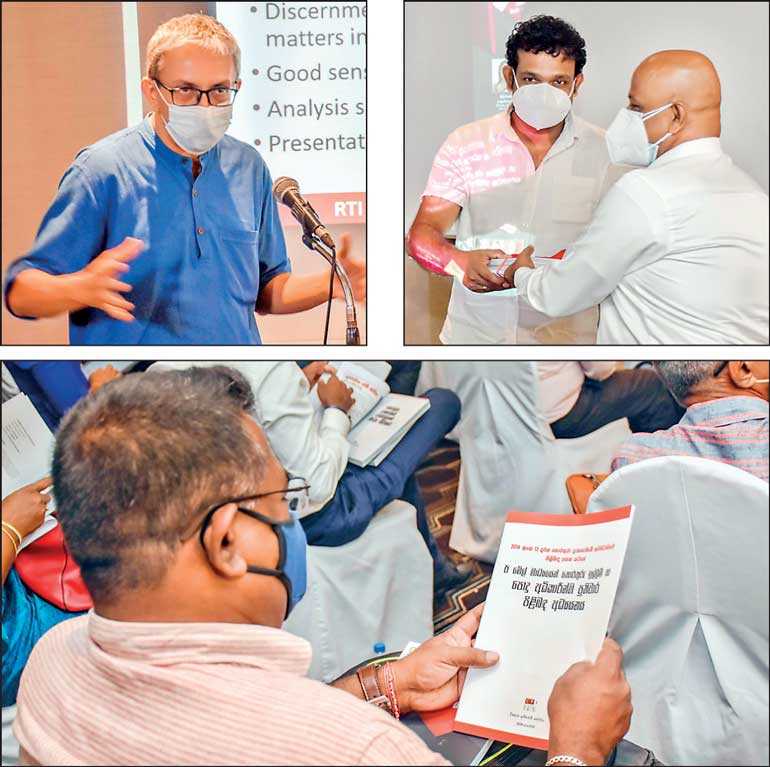Saturday Feb 14, 2026
Saturday Feb 14, 2026
Friday, 19 February 2021 00:00 - - {{hitsCtrl.values.hits}}

The Centre for Policy Alternatives (CPA) officially launched the publication ‘The Right to Information and Media Practice’ and the research report on the ‘Responsiveness of Public Authorities to Right to Information Applications submitted via Email’ on 21 January at the Renuka City Hotel, Colombo. The initiative was conducted in partnership with the Friedrich-Naumann-Foundation For Freedom (FNF).
The event was attended by a number of distinguished dignitaries including members of the diplomatic community, well known senior journalists, independent authors, RTI users, civil activists, representatives from government officers and ministries in addition to Civil Society Organisations, Non-government organisations and research institutes.
The Publication was a collection of news articles and success stories derived through RTI elicited information by prolific journalists and RTI users who have worked closely with CPA. While investigative journalism is one of the key contributions that strengthens democracy and accountability, the publication includes a series of wide ranging stories proving that RTI is a potent weapon of investigative journalism.
The publication will empower journalists and the public to utilise RTI legislation to secure documentary proof they need to add credibility to their stories and report in a more balanced and responsible manner. Hence, the launch of this publication will benefit in the long-term towards bolstering investigative journalism while strengthening democracy, fair governance and accountability and popularize the use of RTI amongst the Sri Lankan media and the civil society.
The research study aimed at assessing the responsiveness of public authorities to requests for information made via emails.
Emphasising the importance of the use of electronic media in requesting information in the context of the COVID-19 pandemic situation, a total of 695 requests for information were sent by email in Sinhala and Tamil, to the official email addresses of 695 public authorities. These 695 sample public authorities included Divisional Secretariats, Provincial Councils, Police Stations, Hospitals, Agrarian Development Offices, Provincial Departments of Education, Offices of the Sri Lanka Electricity Board and Regional Offices of the Water Supply and Drainage Board.
Thus, the research recommends the need to replace functioning email addresses of all public authorities in relevant websites, to widen public awareness about the implementation of the right to information using electronic means and for authorities to support and respond to information requests through electronic means as the best alternative to the direct exercise of the right to information amid the COVID-19 pandemic situation.
The event included a scholarly lecture by senior journalist Nalaka Gunawardena who stressed on the lack of sufficient RTI implementation in radio stations, TV channels and newsrooms in Sri Lankan media networks, the need to mainstream RTI as a tool for problem solving policy advocacy while bridging networks between journalists, civil society groups and social activists for integrating RTI into wider social change as future recommendations towards bolstering RTI implementation in Sri Lanka.
A panel discussion on the theme ‘The Right to Information Act and its Media Practice in the Digital Age, and Citizen Activism’ was conducted by a team of well-informed and reputed panellists, namely, LIRNEasia Founding Chair Prof. Rohan Samarajiva, Center for Investigative Reporting Executive Director Dilrukshi Handunnetti, South Asia Free Media Association Founder President Lakshman Gunasekara and Ada Editor Kanchana Dasanayaka, led by Centre for Policy Alternatives Executive Director Dr. Paikiasothy Saravanamuttu, who, reflecting on past experiences, discussed numerous contributing factors to the current trends of declining investigative reporting and lack of RTI usage in the existent media industry, such as the shrinking of media freedom, the lack of access to public documents, insufficient awareness among RTI users, shortcomings in governance mechanisms among others.
Thus, the launch of ‘The Right to Information and Media Practice’ and the research report on the ‘Responsiveness of Public Authorities to Right to Information Applications submitted via Email’ proved to be a reinforcing stepping stone for greater future initiatives to bolster investigative journalism while strengthening democracy, fair governance and accountability through the effective use of the RTI amongst the Sri Lankan media and the civil society.

